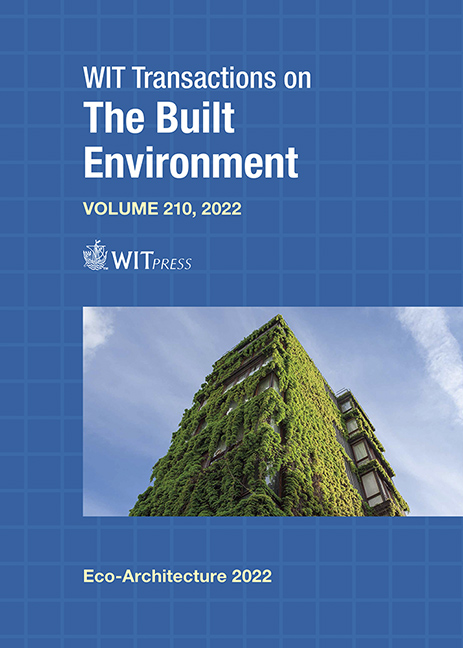OVERVIEW OF THE PERFORMANCE OF AN EXTERNAL VACUUM INSULATION COMPOSITE SYSTEM
Price
Free (open access)
Transaction
Volume
210
Pages
10
Page Range
31 - 40
Published
2022
Paper DOI
10.2495/ARC220031
Copyright
Author(s)
NUNO SIMÕES, MÁRCIO GONÇALVES, CATARINA SERRA, INÊS FLORES-COLEN
Abstract
The external thermal insulation composite system (ETICS) is a construction technology commonly used for insulating building walls. Incorporating a super-insulation material, such as vacuum insulation panel (VIP), ETICS is a solution with great potential for improving the thermal performance of façades towards achieving nearly-zero energy buildings. However, the application of VIPs in buildings presents several challenges that need to be taken into account. Namely, those associated with handling and installation issues, design factors, as well as with the edge thermal bridging that occurs between panels, the doubts surrounding long-term performance and the high investment costs of vacuum technology. Also, conventional ETICS often presents early-signs of anomalies that could be worsened by using VIPs. Thus, many aspects need to be evaluated before VIP based ETICS become a viable solution. The main goal of this paper was to study the feasibility of incorporating a VIP solution into ETICS. For this purpose, an extensive investigation into the solution was carried out, following mainly experimental approaches. First, focus was put on the VIP thermal performance, in particular regarding the edge thermal bridging effect. Then, VIP-based ETICS walls were evaluated in terms of the whole system hygrothermal performance and durability. Real onsite walls and laboratory large-scale test specimens were assessed. New experimental procedures were defined to evaluate the durability of the solution and to enable the early identification of potential anomalies, in particular when exposed to solar radiation. Lastly, the cost-effectiveness of vacuum technology was analysed by means of a life cycle costing assessment. This research indicates that VIPs can be successfully used in ETICS. Nevertheless, such integration needs to be meticulously performed, since concerns specific to VIP installation need to be taken into account.
Keywords
vacuum insulation panels, ETICS, hygrothermal performance, experimental testing, onsite monitoring, life cycle costing





